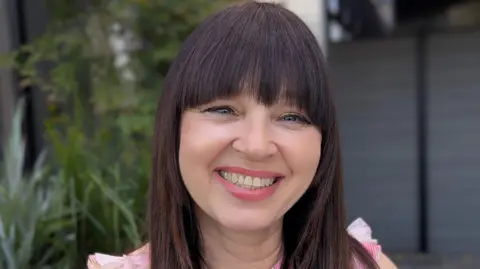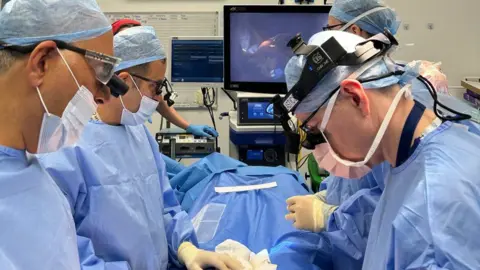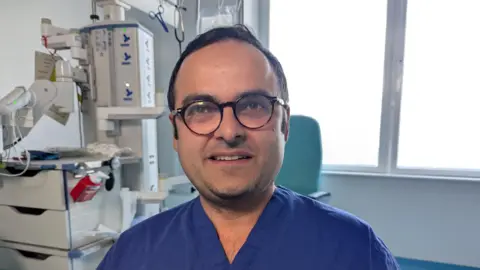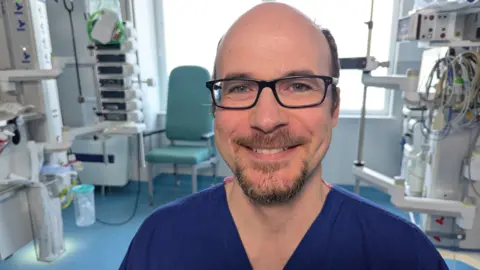Woman has pioneering breast reconstruction surgery
 BBC
BBCThe first patient in the UK to have a new form of breast reconstruction surgery says she now "feels whole again".
Tanya Tanna, who is 56 and from South Ruislip, west London, had the operation following her cancer diagnosis and mastectomy.
A team of London surgeons developed and performed the keyhole procedure, which is less invasive, aids a quicker recovery and reduces the chance of getting a hernia.
They called it "a massive breakthrough in cancer surgery".
 Royal Free Hospital
Royal Free Hospital"After this complex surgery, lasting eight hours, I was expecting a large amount of pain," said Tanya.
"But I felt no pain, and the day afterwards I was up and about walking. The nurses were looking at me as if it was a miracle!"

Mr Dariush Nikkhah, a consultant plastic surgeon at the Royal Free Hospital, and Mr Alistair Slesser, a consultant colorectal surgeon at Hillingdon Hospital, pioneered the approach using keyhole surgery, which modified a breast reconstruction surgery technique being used in a few places around the world.
Patients undergoing the breast reconstruction procedure, known as DIEP flap surgery, have a blood vessel taken from their abdomen.
The blood vessel and surrounding tissue are then used to build a new breast.
Normally, DIEP flap surgery needs a 10-12cm internal incision in the patient's abdominal wall to remove that blood vessel. The modified procedure involves an internal incision of only 2-3cm.
"The Royal Free Hospital is now one of the few centres in the world which can offer this type of surgery," said Mr Nikkhah.
"It's more difficult to perform but improves recovery. Whereas patients usually need four to seven days in hospital to recover, this surgery requires only one to two days."

Mr Slesser said: "This is a massive breakthrough in cancer surgery."
He said the team was refining the process and working on performing operations using a robotic surgical system in the future.
"The surgeon would control the instruments from a console using robotic arms. This would allow greater control and magnification, for precise and meticulous surgery," he said.
Tanya had a mastectomy in 2020 following a breast cancer diagnosis, but the pandemic and the backlog of other patients meant she had a long wait for reconstructive surgery.
It was Mr Nikkhah who suggested the new procedure for her.
"When I heard that I would be the first patient in the UK to have this procedure I was a bit nervous but so excited and willing to be part of this," Tanya said.
"My family said 'you must be crazy!' but I couldn't imagine saying no."
She added: "The team promised to make me feel whole again, and that's what they did. Now I can look at myself and think: 'Yes, I am whole again!'"
Listen to the best of BBC Radio London on Sounds and follow BBC London on Facebook, X and Instagram. Send your story ideas to [email protected]
